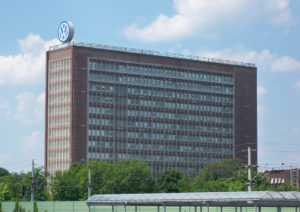Volkswagen Set to Cut 30,000 Jobs
At a conference in Wolfsburg, Germany on November 18, German automobile company Volkswagen formally announced that it plans to cut 30,000 jobs worldwide, with 23,000 of those jobs in Germany itself. The announcement of these layoffs comes as a part of a restructuring plan following the company’s recent diesel emissions scandal.

In September 2015, the United States Environmental Protection Agency (EPA) discovered that many Volkswagen cars sold in the United States contained software that falsified reporting of nitric oxide and nitrogen oxide levels during emissions testing, often underreporting emissions by a factor of 40. The EPA deemed this a violation of the Clean Air Act and accused Volkswagen of having intentionally programmed turbocharged direct injection diesel engines to activate certain emission controls only during laboratory testing. Besides achieving notoriety in the months after the scandal, the company has had to set aside billions of euros to deal with the crisis since it came to light, leading to its first annual loss in more than 20 years, along with a string of legal cases worldwide.
Volkswagen’s recent announcement of job cuts is part of a bigger effort to reinvigorate the company at its core and allocate funding towards development of a new line of electric cars. Estimates suggest that the job cuts should bring annual savings of around $3.92 billion by 2020. Herbert Diess, the Chairman of the Board of Management of the Volkswagen Passenger Cars brand, has stated that the cuts would make the company “leaner and more efficient.”
Volkswagen is looking to begin the development of a new line of electric and self-driving cars as part of a cleaner, greener effort to re-establish itself as a strong contender on the international automobile stage and hopes to launch 30 electric-powered vehicles by 2025. Moreover, the company’s top staff representative in Germany, Bernd Osterloh, remarked on the domestic nature of the new models, saying, "The next generation of electric vehicles will be made here in Germany, not abroad."
Amidst some concern surrounding the possibility of protests and dissent regarding the layoffs, Volkswagen has promised that it has taken steps to ensure that its employees will not leave feeling neglected. Workers in Germany, for example, will not be forced out of their positions. Rather, offers of early retirement will likely provide a large portion of the cuts. In addition, the company plans to create 9,000 “future proof,” or guaranteed, positions as part of an investment in new products, so many workers are set to simply move to new posts.
Volkswagen chief executive Matthias Müller announced that the plan was "the biggest modernization program in the history of the group's core brand…. The VW brand needs a real shake-up and that is exactly what the future pact has turned out to be." The program, then, represents a cultural reformation set to redefine both the name of the company and the future of the automobile industry.
